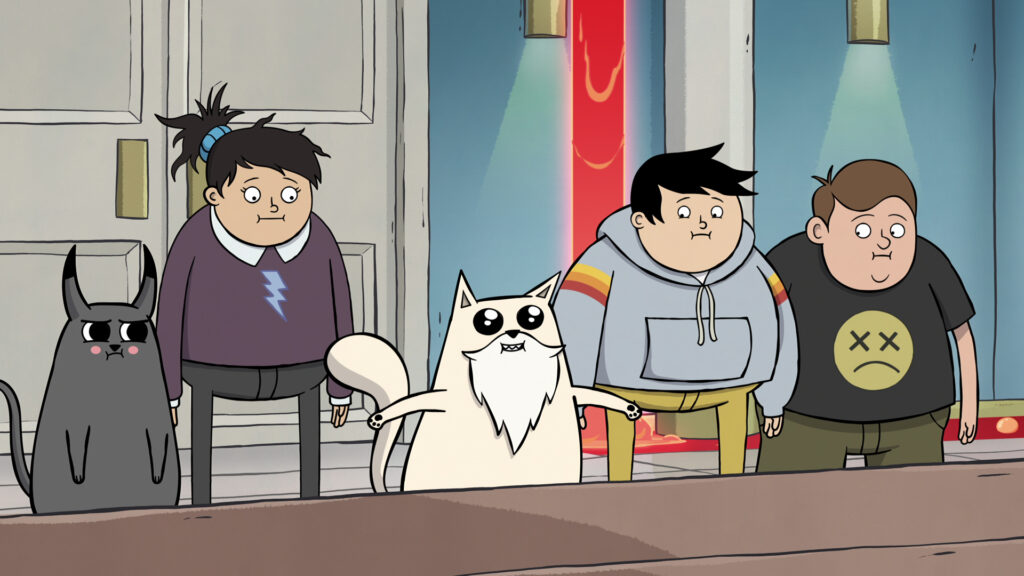Through its humorous story, the highly anticipated TV version of the well-known card game, Exploding Kittens: Season 1, explores a number of fascinating themes. The ultimate conflict between good and evil is depicted in the series, which was created by Matthew Inman and Shane Kosakowski. God and his adversary, the spawn of Satan, are sent to Earth in the form of talking cats. The divine and demonic cats navigate the complexities of human life while living with the dysfunctional Higgins family, which results in a humorous yet profound exploration of various themes.
Good Versus Evil
Exploding Kittens: Season 1 revolves around the age-old conflict between good and evil. Godcat and Devilcat, who must coexist on Earth in feline forms, are the embodiments of this never-ending struggle. The show deftly uses commonplace circumstances to depict their rivalry, transforming routine tasks into thrilling conflicts. For example, the two cats compete in the God Games, a competition between high stakes and humorous scenarios, for control of Heaven and Hell, in the episode “Let the Games Begin.” This theme offers a commentary on the nature of morality and the ambiguities that lie between the concepts of good and evil in addition to being a source of humor.
Family Dynamics
Godcat and Devilcat live with the Higgins family, which is a microcosm of contemporary family life, complete with quirks and dysfunctions. The family’s interactions provide important insights into modern family dynamics and the difficulties they encounter. The Westminster Human Show and Pilot are two episodes that demonstrate how the presence of angelic and demonic entities alters family dynamics, frequently bringing them closer together in unexpected ways. Through the interactions of the family, the series delves into themes of love, loyalty, conflict, and reconciliation. The relationships that the characters have with the cats also mirror their own growth and struggles, which makes the family dynamics an essential part of the story.
Divine and Earthly Perspectives
The conflict between divine and earthly viewpoints is a major theme in the series. Godcat and Devilcat, despite their celestial origins, must navigate the human world, often finding it bewildering and frustrating. This theme is humorously explored in episodes like “Emotions Are Hard,” where the cats struggle to understand human emotions and behaviors. The series uses this clash to offer a satirical look at human nature, questioning societal norms and behaviors from an outsider’s perspective. The divine characters’ attempts to adapt to earthly life serve as a metaphor for the broader human experience, highlighting the absurdity and complexity of existence.
Existential and Moral Questions
Exploding Kittens: Season 1 is mostly a comedy, but it also tackles existential and moral issues head-on. The show raises interesting queries concerning free will, fate, and the definition of good and evil. For instance, Travis tries to undo his greatest regret in “No Regrets,” but he ends up with unanticipated consequences. Like many of the other episodes, this one encourages viewers to consider their own beliefs and decisions by combining humor with deeper philosophical questions. The show is engaging to watch because of its ability to balance humorous themes with weighty subjects.
Exploding Kittens: Season 1 is a funny and thought-provoking comedy-drama that deftly blends humor and complex themes. The exploration of good versus evil, family dynamics, and the clash between divine and earthly perspectives provides a rich tapestry of narratives that resonate with viewers. By infusing existential and moral questions into its comedic setting, the series offers a unique and insightful look at the human condition, making it a standout addition to the world of television comedy.
